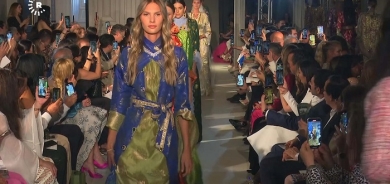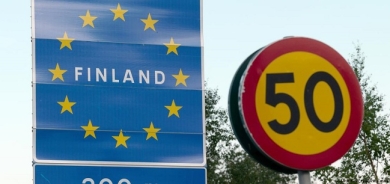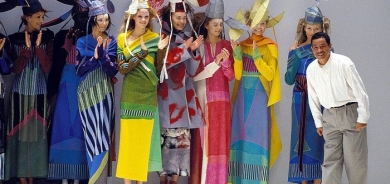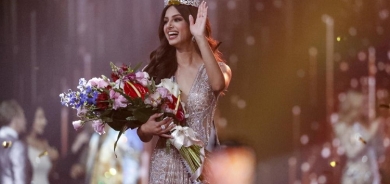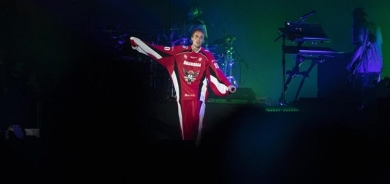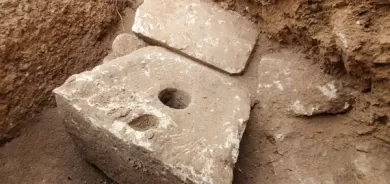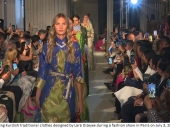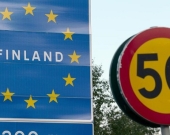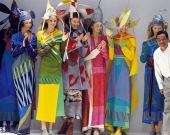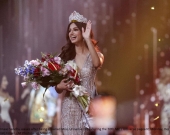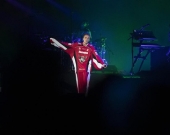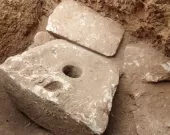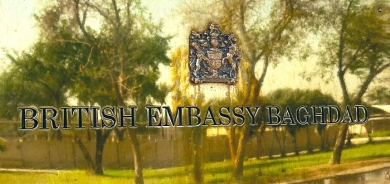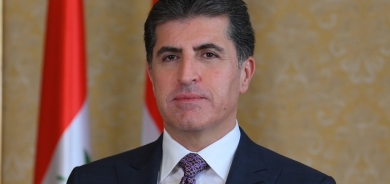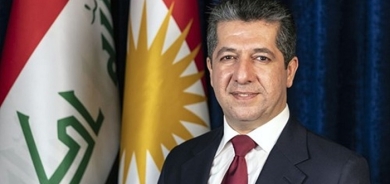Designer strives to help Kurdish fashion bloom
October 5, 2015
Miscellaneous
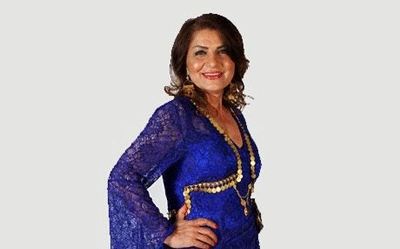
Well-known Kurdish fashion designer Della Murad was born in Halabja, in the Kurdistan region of Iraq. She moved to Baghdad at the age 2 and stayed there for 22 years, studying biology and later teaching it in secondary school in the Kurdistan region.
In 1989, she went to London to work as an image consultant and fashion designer. She organized her first fashion show in 2002 in London, and has since organized shows in the Netherlands, Germany, Dubai and the Kurdistan region.
Murad has presented fashion shows with the coordination of museums including the renowned Victoria and Albert Museum in London to promote traditional Kurdish clothes.
She now works as artistic director of UK-based Gulan Media, a charity that promotes Kurdish tradition and culture.
As part of Rudaw’s series on influential Kurdish women, Murad spoke with Simav Mazher on September 30 to discuss the role of fashion in the Kurdish community.
RUDAW: How did you get your start in fashion?
DELLA MURAD: The trigger was I was invited to a very posh party in Germany and I was dressed in Kurdish clothes as I always dress. While I was coming down the stairs, everyone thought I was a princess from the Arab world, so this had a major affect on me and I was very angry because people could not recognize Kurdish tradition and culture.
I decided to promote and introduce Kurdish fashion to the world. Everyone was asking, ‘Who is she? Is she from the Arab world? Is she an Arab princess.’ I am talking about almost 25 years ago and the world did not know much about Kurdistan. I was telling them this is traditional Kurdish clothes but no one had a clue.
World countries pay attention to their traditional clothes, what is stopping us from doing the same? I started collecting designs and playing with the colors. My mom, relatives and close friends started collecting Kurdish clothes for me and I started my career by organizing some fashion shows. Now, I have a very big archive of old traditional Kurdish clothes. I have pieces that go back to 100 years ago.
What role does fashion play in women’s lives?
Fashion is important in our lives, but not important enough to be obsessed with. There are so many people who go too far with fashion. I think fashion is good when you know exactly what is good for you.
Why do you think Kurdish fashion has been neglected? We barely hear about a fashion show for promoting Kurdish clothes. Is it because the limited numbers of Kurdish fashion designers?
There are two problems. First, is the Kurdish models and second is the budget. Fashion shows are very expensive and as an individual fashion designer, I will never be able to organize a fashion show without any support.
I believe that our society is not aware of the important role of fashion. If you talk to the politicians they will claim that we have other major needs such as roads, hospital and so forth. They prefer to spend the budget on other things.
In Dubai, I could not find a Kurdish model, I had to choose girls that look like Kurdish girls. When I had fashion shows in UK, all my models were foreigners. The mayor of London was amazed by the style and the colors. I love to continue doing that. I love promoting my culture and tradition. I believe, this what makes us unique.
I have tried to approach officials from KRG, when I wanted to organize a fashion show in Erbil they did not have enough money to pay the models. For me, it is very important my models to be comfortable wearing Kurdish clothes. Models get paid well, because they show the beauty of the outfit. If you have a limited budget, you will bring students, and the students will not be able to walk properly and they will not be able to present it well. This is not how a fashion show should be organized.
I have organized fashion shows from my personal budget, because I love what I do and I want to promote Kurdish fashion. If I am fully funded, I can participate in London fashion week or Milan fashion week. We need sponsors. Money is spent on everything else apart of from culture.
With so much turmoil in the world, especially for Kurds who are fighting ISIS on the frontlines. What role can fashion play?
I think the role I can play as an individual is to organize a fashion show to raise funds for the families of Peshmerga and this is my current plan. In any area you are in, you can always play a role to help the Kurds and especially the Peshmerga at this critical time.
Why is the number of Kurdish women in the fashion industry so limited?
In 2007, I organized a fashion show in Erbil and I had the most difficult time finding models. In the end, I agreed to anything and most of the clothes were ripped up. But, when I went to Sulaimani, I had 50 girls to choose from. There is a huge gap between Erbil and Sulaimania.
Religion and culture have a major affect on women’s performance in the Kurdish community. Erbil is more conservative than Sulaimani. All this modernization and fashion are very new to us. Everything is new to Kurdistan because it came to us very fast and we did not take it gradually. We do not have a Kurdish word for “designer.” We do not have a word for “image consultant.” We do not have the concept of design.
When I tell people that I am an image consultant, they do not understand. I have to explain it to them. Most of the models I work with are from eastern or northern Kurdistan. About religion, I have respect for all the religions but do not [let that] isolate yourself from the society. If they let us, we can do a lot.
We strive to be brave women. Women who refuse to surrender from the first attack. We need the young generation to step up. We need women to come and change this.
What is required to promote Kurdish fashion?
A school of design in Kurdistan is very important. Since we do not have expert designers, then we need to export from other countries. Maybe after few years we will have so many designers then we will be able to open a school of design. We get experts for oil, but not for fashion.
There are many girls who are interested in fashion, but there are no places to turn to. When we have designers, we will have competitions and when we have competitions we will grow and participate in fashion shows around the world.
Did you encounter any challenges in your career? And do you think those challenges would have changed if you were in Kurdistan?
I was lucky not to be in Kurdistan when I started my career because I was not only criticized by men, I was more criticized by women. I believe if I was living in Kurdistan, I would have many challenges, because I am quite aware what a male-dominated society is.
I am known to be a very strong woman, but when I am in Kurdistan I doubt my strength for that. I always feel for the young generation and when strong, young women are trying to break through, I support them and praise them. I tell her, ‘Yes, bloom, because this is what we need in the society.’ [We need] strong women to step up to things and say no matter … I will do it.
I believe if you are satisfied and happy with what are you doing, you will make others happy as well. Women in our society try to act like men and they start to forget themselves and their power. If you are yourself, you are the most wonderful and powerful human being.
Kurdish women are under a lot of pressure, but when they come out of that box and feel the freedom they bloom. Once you discover your strength, you will behave differently but they do not let you discover your strength. If women in Kurdistan will be given the opportunity, they will bloom, because it is home. You bloom more in home than anywhere else.
How would you describe the opportunity for Kurdish women in Kurdistan?
It was very good before ISIS. The current situation in Kurdistan is dragging everyone down. Even if you have good ambitions or good energy, you will be dragged down. People are struggling differently now in Kurdistan about the budget, schooling, electricity and so many other issues.
Economy is very important and the current situation of economy in Kurdistan is trembling. The war and economic shortfall leave no space for creativity. How can I organize a fashion show full of colors while my neighbor having a funeral for martyred Peshmerga.
Currently, the countries of the world look at us differently. When I say I am from Kurdistan they say, ‘You fight ISIS. Yes, Peshmerga fighters are my heroes.’ This is internationally, but locally, it has affected us negatively. The reaction of people outside Kurdistan is fantastic.
How Kurdish women fought for Kurdistan is remarkable. I am very optimistic for the future of Kurdish women. In a very short time, we had business women, Peshmerga women, makeup artists, and journalists. We are no different from the women of the rest of the world.
I believe that compared with the past, Kurdish woman are more confident and they believe in themselves and they have good opportunities ahead of them.
What is your advice for Kurdish women who want to pursue their dreams?
Do not keep on dreaming. Act on it. Appreciate what you have and live the moment.
What is your favorite memory of Kurdistan?
Everything about Kurdistan. I miss the people of Kurdistan. Kurdistan is home and, east or west, home is best.
And what is your least favorite memory of Kurdistan?
When I was teaching in Halabja in 1983. I was encouraging students to demonstrate against the Saddam [Hussein] regime. One of the worst memories is when I was arrested and questioned. But because I knew Arabic very well, luckily I was released.
What do you think about the huge number of refugees heading to Europe?
We all deserve a better life. At the time, I fled Iraq it was the Iraq-Iran war. The people who leave Kurdistan, what do they expect to have in Europe? They will be placed in camps. Before we came to Europe, people had so much respect for us. Now, this is not the same Europe as before. With the current conflict in Iraq, and ISIS massacring innocent souls, we are being looked at differently.
People should consider this before heading to Europe. I know they are seeking a better life and better education. I know there is a lack of opportunities, especially for girls. Most of the time I tell myself, I wish I only knew Kurdistan. Now, I do not belong here and I do not belong to Kurdistan. The situation in Europe is not to live and not to die.
How often you wear Kurdish traditional clothes?
Always. Even at the British parliament, they know me as the woman with Kurdish clothes.
Rudaw

